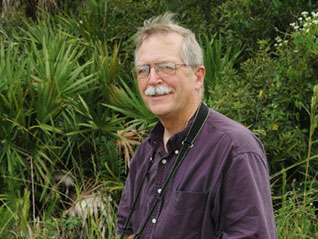
Photographed by Bette Jackson
If you are have difficulty playing the audio click here
Source: Baby Birds 1
Length of Segment: 00:01:14
Hi, I'm Dr. Jerry Jackson, out with the wild things. It's that time of year: it's nesting season for most of our backyard birds. It's also the time of year that wildlife rehabilitation centers are inundated with orphan baby birds. Most backyard bird babies are songbirds, small birds that must lay pretty small eggs. As a result of the size of their eggs, there's a very limited supply of nutrients that can fit inside, so growth of the bird in the egg must be limited and most development takes place after hatching. If you're lucky enough to find a nest with eggs in it, it's well worth your time to take note of the daily events that take place. And also, we're sharing with the youngster from a distance. Don't touch the eggs. The parent birds will not smell your scent on the eggs and abandon them. Most birds have a poor sense of smell, but mammals such as squirrels and cats and also climbing snakes can tell you've been there by smell. The most important reason not to touch those bird eggs is that there is a tiny, living, breathing creature inside. The egg shell is porous, so that the developing chick can breathe. If you handle a bird egg, oils from your skin can plug the pores in the shell and cause the chick to suffocate.
'With the Wild Things' is produced to the Whitaker Center in the College of Arts and Sciences at Florida Gulf Coast University. For 'The Wild Things', I'm Dr. Jerry Jackson.
< Back to Baby Birds
Length of Segment: 00:01:14
Hi, I'm Dr. Jerry Jackson, out with the wild things. It's that time of year: it's nesting season for most of our backyard birds. It's also the time of year that wildlife rehabilitation centers are inundated with orphan baby birds. Most backyard bird babies are songbirds, small birds that must lay pretty small eggs. As a result of the size of their eggs, there's a very limited supply of nutrients that can fit inside, so growth of the bird in the egg must be limited and most development takes place after hatching. If you're lucky enough to find a nest with eggs in it, it's well worth your time to take note of the daily events that take place. And also, we're sharing with the youngster from a distance. Don't touch the eggs. The parent birds will not smell your scent on the eggs and abandon them. Most birds have a poor sense of smell, but mammals such as squirrels and cats and also climbing snakes can tell you've been there by smell. The most important reason not to touch those bird eggs is that there is a tiny, living, breathing creature inside. The egg shell is porous, so that the developing chick can breathe. If you handle a bird egg, oils from your skin can plug the pores in the shell and cause the chick to suffocate.
'With the Wild Things' is produced to the Whitaker Center in the College of Arts and Sciences at Florida Gulf Coast University. For 'The Wild Things', I'm Dr. Jerry Jackson.
< Back to Baby Birds
These recordings are copyright 2007 by WGCU Public Media. They are being made available in the PALMM Digital Library with the express permission of the rights holder.
For permissions please contact the owning institution. WGCU Public Media, 10501 FGCU Blvd. S., Fort Myers, FL 33965
For permissions please contact the owning institution. WGCU Public Media, 10501 FGCU Blvd. S., Fort Myers, FL 33965




